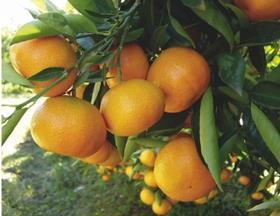
The South African citrus industry is urgently trying to limit damage to its exports to Europe after European authorities have intercepted the first consignment of the season because of citrus black spot.
South Africa’s Citrus Growers’ Association (CGA) confirmed that Plant Health Authorities in the Netherlands intercepted a consignment of South African citrus with citrus black spot (CBS) on Thursday in Rotterdam. The CGA said the EU has issued a notification of phytosanitary non-compliance because of the interception.
“This is disappointing news particularly considering the steps taken to ensure compliance and to demonstrate commitment to meeting the European Union’s requirements, at enormous cost to the South African government and citrus industry – including testing regimes and a comprehensive CBS risk management plan,” said the CGA.
Spokesman Justin Chadwick said the CGA and representatives of the South African Department of Agriculture, Forestry and Fisheries (DAFF) are urgently trying to find out how the contaminated consignment slipped through despite the industry’s risk management plan. “The Citrus Growers Association (CGA) will dispatch an accredited expert to accompany representatives of the DAFF to the farm in question,” said Chadwick. “They will investigate how CBS could have slipped through the risk management net and, importantly, to propose any remedial measures necessary to prevent a reoccurrence.”
At the same time, the CGA’s Special Envoy for the EU, Deon Joubert, has left for Europe for discussions on this with all stakeholders. “While today’s interception is a setback, it is also an opportunity for us to improve our risk management processes, which we will continue to implement in order to ensure unrestricted trade conditions for the immediate future.”
The new EU regulations pertaining to CBS, announced at the beginning of July, will come into effect on Thursday, 24 July. From this date, all South African citrus arriving in European ports will have to carry additional phyto certificates. During the past week, citrus leaders expressed concern that fruit shipped prior to the date the EU published the new regulations may arrive in Europe after Thursday’s implementation and may therefore not carry the new documentation. Joubert said last week that he planned to be in Europe this week ‘to be close’ to stakeholders and help to monitor and handle any problems that may arise.
There are also indications that South Africa is not going to accept the new dispensation without a fight. Chadwick said in his statement today that the CGA wanted to again place on record that there has been no agreement between South Africa and the EU on the risk of CBS being transmitted by fruit to the EU since 1992.
“Despite the substantial efforts of the departments of Agriculture, Forestry and Fisheries, and Trade and Industry, as well as the Citrus Growers’ Association (both locally and abroad), there is still no agreement on whether commercial fruit from areas where CBS is present is a risk to citrus-producing countries of the EU where CBS is absent, the magnitude of any possible risk, or the measures required for adequate mitigation of the actual risk,” said Chadwick. “It remains imperative that this difference of opinion – and the science that underlies it – is resolved once and for all.”
He said the EU remains an important historic market for the South African citrus industry. “The CGA calls on the minister of agriculture, forestry and fisheries, minister Senzeni Zokwana, to prioritise the swift and amicable resolution of the CBS dispute with the European Union,” said Chadwick. “The future of this important agricultural sector, the 120,000 jobs and their 1.2m dependents depend on it.”
For South African citrus growers, there will now be a nervous period because historically they have been more at risk from CBS interceptions during the Valencia season. Joubert has previously stated that the South African industry will do everything it can to avoid exceeding the threshold of interceptions. This could result in a new ban on South African citrus imports.
South African sources now speculate that the country may well decide to temporarily halt exports if there is a risk of exceeding the minimum level of interceptions to avoid action by the EU.



